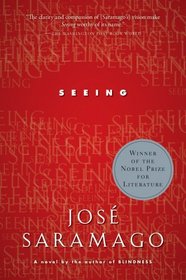I read this because it's the sequel to "Blindness," and although I didn't wholeheartedly love that book, it was intriguing enough to make me want to know where the author was going to go with this.
The first half of the book makes no reference to the first book, and I was beginning to wonder if it was merely a conceptual sequel, but the characters from 'Blindness' appear in the latter portion of the book.
Mainly though, this book is Saramago's acerbic criticism of politics, his commentary on the suspicious nature of bureaucracy, power and the abuse of power, and how the innocent and the doers-of-good are crushed by such systems. Although it's less unpleasant to read than 'Blindness,' with its tangibly repellent descriptions, this book is even less uplifting.
However, it is accurate, true, and worthwhile.
Still... paragraphs, quotation marks, all the trappings of grammar... I like 'em, and think they're useful. Saramago doesn't.
The first half of the book makes no reference to the first book, and I was beginning to wonder if it was merely a conceptual sequel, but the characters from 'Blindness' appear in the latter portion of the book.
Mainly though, this book is Saramago's acerbic criticism of politics, his commentary on the suspicious nature of bureaucracy, power and the abuse of power, and how the innocent and the doers-of-good are crushed by such systems. Although it's less unpleasant to read than 'Blindness,' with its tangibly repellent descriptions, this book is even less uplifting.
However, it is accurate, true, and worthwhile.
Still... paragraphs, quotation marks, all the trappings of grammar... I like 'em, and think they're useful. Saramago doesn't.




